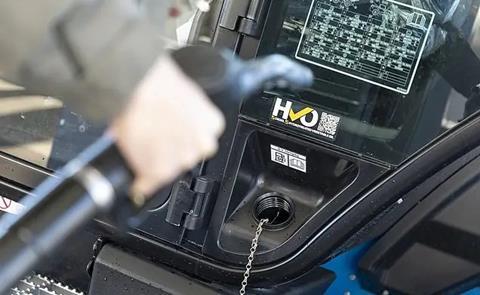Austria-headquartered Felbermayr is testing the use of alternative fuels, including hydrotreated vegetable oil (HVO), in parts of its fleet in an effort to reduce greenhouse gases.

Felbermayr said that an initial practical project showed that implementation is feasible and effective. The company’s ESG and compliance manager Katharina Perfahl said: “In order to continue to meet customer requirements and legal requirements, we are testing alternative drive solutions at an early stage. For areas of application without available alternatives, HVO is a useful transition technology.”
According to Felbermayr, with appropriate quality and production, CO₂ emissions can be reduced by up to 90 percent while using HVO when compared to conventional diesel.
At the Loisach-Isar Canal, Hagn Umwelttechnik (a Felbermayr Group company) is sealing a 1.6 km-long section of sewer on behalf of the energy company Uniper. Several machines are being deployed, all of which are refuelled with HVO: a 15-tonne mobile excavator, a 25-tonne crawler excavator, a 29-tonne long-handled excavator and a telescopic crawler crane.
The additional costs of around 20 cents per litre – with a weekly requirement of 3,000-5,000 litres – are shared equally by both project partners.
Felbermayr workshop manager Josef Kreuzmayr added that there have been no disadvantages: “HVO does not result in any loss of performance,” and the diesel replacement is also comparable to fossil fuel in terms of maintenance intensity.
Perfahl continued: “We pay particular attention to the origin of the raw materials used and attach great importance to their traceability. With appropriate certificates, we can ensure that the use of HVO actually contributes to greater sustainability. Pilot projects like this help us set the right course for the future.”
For its rental equipment, Felbermayr said there is increasing interest from its customers for sustainable solutions. Around 70 percent of its work platform fleet is powered by batteries or hybrids. In addition, diesel-powered devices that, according to manufacturer information, are suitable for HVO, will be marked with a sticker in the future.
















